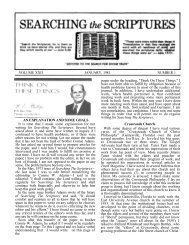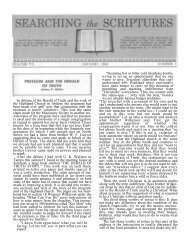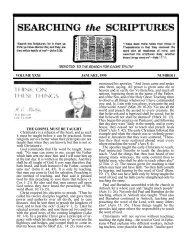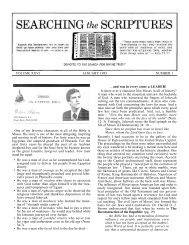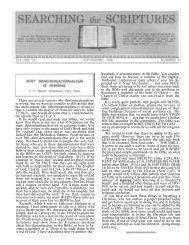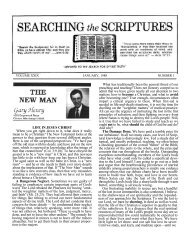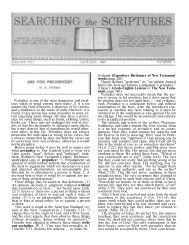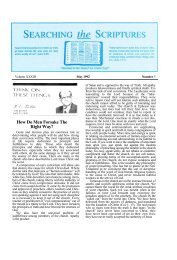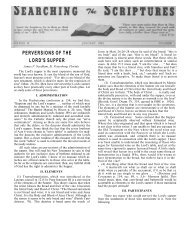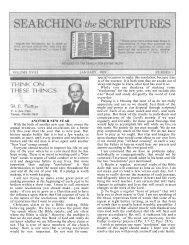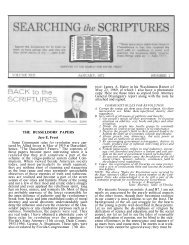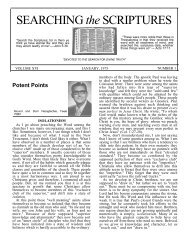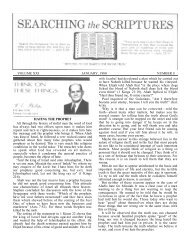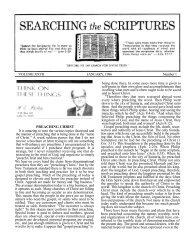In Ephesians 5:22-33, Paul drew an analogy between the ...
In Ephesians 5:22-33, Paul drew an analogy between the ...
In Ephesians 5:22-33, Paul drew an analogy between the ...
Create successful ePaper yourself
Turn your PDF publications into a flip-book with our unique Google optimized e-Paper software.
___________________________________________________________________________________________________ Page 23<br />
<strong>the</strong> shield <strong>the</strong> soldier was sure to suffer. Our faith serves<br />
as our shield to protect us from <strong>the</strong> "fiery darts of <strong>the</strong><br />
wicked" (v. 16). When we lose our faith or it becomes<br />
weak, we are like <strong>the</strong> soldier who becomes a coward <strong>an</strong>d<br />
throws down his shield <strong>an</strong>d runs back (Heb. 10:35).<br />
5. "And take <strong>the</strong> helmet of salvation ..." (v. 17).<br />
The helmet was a defensive part of <strong>the</strong> armour worn to<br />
protect <strong>the</strong> head of <strong>the</strong> soldier. The hope of eternal<br />
salvation protects <strong>an</strong>d preserves us through all <strong>the</strong><br />
battles of life. Were it not for that assur<strong>an</strong>ce we would<br />
have no reason to endure <strong>the</strong> hardships of <strong>the</strong> soldier (2<br />
Tim. 2:3).<br />
6. "... <strong>an</strong>d <strong>the</strong> sword of <strong>the</strong> Spirit, which is <strong>the</strong><br />
word of God" (v. 17). The soldier carried a short sword<br />
much like a dagger. It was <strong>an</strong> offensive part of his<br />
armour. He used it to make his attack on his enemy. The<br />
word of God is our sword. The Bible is not compared to<br />
a soft fea<strong>the</strong>r that is to be used to tickle <strong>the</strong> ears of men.<br />
It is a sword! Its purpose is to prick <strong>the</strong> hearts of men.<br />
It must be used to destroy error <strong>an</strong>d slice sin to pieces.<br />
We must bring <strong>the</strong> sword out of its sheath <strong>an</strong>d put it to<br />
use cutting away at <strong>the</strong> efforts of Sat<strong>an</strong>. To be strong is<br />
our duty, to be weak is our sin" (Pulpit Commentary,<br />
Vol. 20, p. 258).<br />
7. "Praying always with all prayers <strong>an</strong>d suppli-<br />
cation ..." (v. 18). M<strong>an</strong>y commentators <strong>an</strong>d o<strong>the</strong>r writ-<br />
ers only list six parts of <strong>the</strong> armour from our text.<br />
However, prayer is very much a part of <strong>the</strong> armour of<br />
those in Christ. While <strong>Paul</strong> does not continue his use of<br />
<strong>the</strong> metaphors in v. 18, it is still a very import<strong>an</strong>t part of<br />
<strong>the</strong> armour. Without prayer we have not put on <strong>the</strong><br />
p<strong>an</strong>oply of God. Prayer streng<strong>the</strong>ns our faith <strong>an</strong>d calls<br />
for <strong>the</strong> help of God. We have access to <strong>the</strong> greatest power<br />
of all through prayer.<br />
The bottom line of <strong>the</strong> armour of God is faithful<br />
adherence to <strong>the</strong> pl<strong>an</strong> of God. Those who are diligent in<br />
<strong>the</strong>ir efforts to serve <strong>the</strong> Lord are armed in Christ to<br />
st<strong>an</strong>d.<br />
Our Aim<br />
1. To abide ("to st<strong>an</strong>d"). Our text says that we are to<br />
put on <strong>the</strong> whole armour of God in order "to st<strong>an</strong>d<br />
against <strong>the</strong> wiles of <strong>the</strong> devil" (v. 11). Two verses later<br />
<strong>the</strong> writer says "Wherefore take unto you <strong>the</strong> whole<br />
armour of God, that ye may be able to withst<strong>an</strong>d in <strong>the</strong><br />
evil day, <strong>an</strong>d having done all, to st<strong>an</strong>d" (v. 13). To st<strong>an</strong>d<br />
me<strong>an</strong>s to hold your ground. <strong>In</strong> battle <strong>the</strong> army tries to<br />
hold its ground <strong>an</strong>d not lose <strong>an</strong>y territory. <strong>In</strong> our war<br />
with Sat<strong>an</strong> we must not allow him to make <strong>an</strong>y ad-<br />
v<strong>an</strong>ces. So, we st<strong>an</strong>d our ground. But, we c<strong>an</strong>'t st<strong>an</strong>d <strong>an</strong>d<br />
compromise at all. We c<strong>an</strong>not compromise on morals,<br />
sin, innovations or <strong>the</strong> doctrines <strong>an</strong>d sounds of men. We<br />
c<strong>an</strong>'t be indifferent toward <strong>the</strong> Lord's work <strong>an</strong>d still hold<br />
our ground. The apa<strong>the</strong>tic army always loses ground.<br />
2. To attack ("to speak"). <strong>In</strong> <strong>the</strong> last verse of our text<br />
<strong>Paul</strong> asked that brethren pray for him that he may<br />
"speak... as I ought to speak" (v. 20). We c<strong>an</strong>not sit idle.<br />
We must attack. It is impossible that "not only in this or<br />
that particular battle but <strong>the</strong> entire war will be lost<br />
unless we exert ourselves" (William Hendriksen, New<br />
Testament Commentary Exposition of <strong>Ephesi<strong>an</strong>s</strong>,<br />
p. 271). As we use our sword to make our attack we must<br />
remember to speak as we ought to speak. We must speak<br />
(a) as <strong>the</strong> oracles of God (1 Pet. 4:11). First <strong>an</strong>d<br />
foremost our message must be true. We must speak<br />
"according as it is written" (2 Cor. 4:13). (b) The whole<br />
counsel of God (Acts 20:27). No part of God's revelation<br />
should be held back, (c) Using great plainness of<br />
speech (2 Cor. 3:12). Hints <strong>an</strong>d vague generalities will<br />
not do. If something needs to be said, we need to say it<br />
plainly. John <strong>the</strong> Baptist was such a spokesm<strong>an</strong> (Mark<br />
6:14-18). Nei<strong>the</strong>r should <strong>the</strong> gospel be clouded by our<br />
feeble efforts to make it sound deeper or more impressive.<br />
May our listeners be impressed, not with <strong>the</strong><br />
messenger, but with <strong>the</strong> simplicity of <strong>the</strong> message, (d)<br />
Boldly (Eph. 6:20). We must present God's message<br />
without apology or great concern about how it will be<br />
received. Amos was just that kind of messenger in <strong>the</strong><br />
Old Testament (Amos. 7:10-17). He refused to bow to <strong>the</strong><br />
pressures of <strong>the</strong> people. His intent was to preach God's<br />
message whe<strong>the</strong>r Amaziah, <strong>the</strong> king or <strong>an</strong>yone else liked<br />
it or not. <strong>Paul</strong> <strong>an</strong>d <strong>the</strong> o<strong>the</strong>r apostles had <strong>the</strong> same<br />
attitude (1 Thess. 2:2). When we shy away from some<br />
area of <strong>the</strong> gospel because we think it will not be well<br />
received we are unfit for <strong>the</strong> Lord's army (Gal. 1:10). (e)<br />
Fearfully (Jas. 3:1). We should realize <strong>the</strong> tremendous<br />
responsibility we have to h<strong>an</strong>dle <strong>the</strong> word properly <strong>an</strong>d<br />
those we teach (2 Tim. 2:15; Eph. 4:15).<br />
Only those "in Christ" are so armed to st<strong>an</strong>d <strong>an</strong>d<br />
speak. "Soldiers of Christ arise <strong>an</strong>d put your armour<br />
on..."<br />
The Holy Spirit presents <strong>an</strong> <strong>an</strong>alogous relationship of<br />
Christ <strong>an</strong>d <strong>the</strong> church with <strong>the</strong> husb<strong>an</strong>d—wife relationship<br />
in <strong>Ephesi<strong>an</strong>s</strong> 5. The comparison is strong <strong>an</strong>d<br />
beautiful. The church st<strong>an</strong>ds in <strong>the</strong> <strong>an</strong>alogy as a bride<br />
<strong>an</strong>d Christ as <strong>the</strong> husb<strong>an</strong>d. Christ died to purchase <strong>the</strong><br />
church <strong>an</strong>d purify it for his own possession. I w<strong>an</strong>t to<br />
embellish <strong>the</strong> figure of a beautiful bride, presented to <strong>the</strong><br />
loving bridegroom. "Husb<strong>an</strong>ds, love your wives, even as<br />
Christ also loved <strong>the</strong> church, <strong>an</strong>d gave himself for it; that<br />
he might s<strong>an</strong>ctify <strong>an</strong>d cle<strong>an</strong>se it with <strong>the</strong> washing of<br />
water by <strong>the</strong> word, that he might present it to himself a<br />
glorious church, not having spot, or wrinkle, or <strong>an</strong>y such<br />
thing; but that it should be holy <strong>an</strong>d without blemish"<br />
(Eph. 5:25-27).<br />
What Is The Church?<br />
The word "church" refers to PEOPLE, "a called out"<br />
people, "<strong>an</strong> holy nation" (Titus 2:14; 1 Pet. 2:9-10). It also<br />
refers to a functional unit of <strong>the</strong> "called out" people in a<br />
local sense (1 Cor. 1:2; 1 Thess. 1:1). These individuals<br />
are called out of darkness into light (1 Pet. 2:9; Acts<br />
26:18; Col. 1:13-14). They are called by <strong>the</strong> gospel (2



